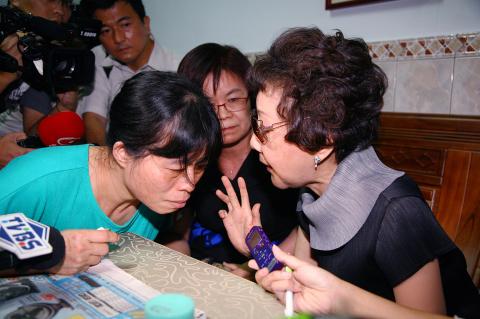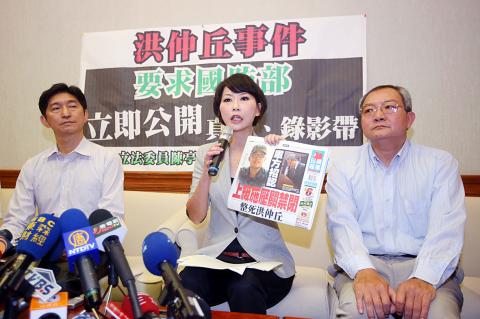The vice commander of the army’s 542nd Brigade, Colonel Ho Chiang-chung (何江忠), was yesterday detained over his alleged role in the July 4 death of army corporal Hung Chung-chiu (洪仲丘).
The Ministry of National Defense said the Military High Court at 10:40am granted military prosecutors’ request to detain Ho. Ho is the first senior military official to be detained over Hung’s death.
The ministry said Ho was suspected of using his position of authority to force other brigade officers to have Hung punished with confinement a few days before he was set to be discharged from the military.

Photo: CNA
Ho is alleged to have committed offenses to personal liberty by a public authority, the offense of coercion by a public authority — both included in the Criminal Code — and the offense of punishing military personnel with categories of punishment not included in the regulations of the Armed Forces Criminal Act (陸海空軍刑法).
The ministry said military prosecutors believe Ho may collude with others and might destroy evidence if he were allowed to remain at liberty.
Senior military prosecutor Major General Tsao Chin-sheng (曹金生) said on Monday that Hung was placed in confinement after senior officers coerced subordinates into carrying out the punishment.

Photo: CNA
Hung, 23, was serving in the army’s 542nd Brigade in Hsinchu County and was due to be discharged on July 6. He was transferred to the 269th Brigade in Taoyuan on June 28 for disciplinary action after he brought a smartphone with a camera onto the base without permission when returning from vacation on June 23.
After being released from confinement on July 3, Hung suffered heat exhaustion during a training session on July 3 and was sent to a military hospital in Taipei.
Hung died at the hospital of multiple organ failure after efforts to resuscitate him failed.
Democratic Progressive Party (DPP) Legislator Hsiao Bi-khim (蕭美琴), who is the convener of the legislature’s Foreign Affairs and National Defense Committee, said she had invited committee members to visit the detention facility in Yangmei Township (楊梅), Taoyuan County, where Hung died.
“I arranged the inspection to assess Hung’s situation while in confinement and to better understand the management and the environment of the military’s confinement system,” she added.
DPP Chairman Su Tseng-chang (蘇貞昌) said President Ma Ying-jeou (馬英九), as commander-in-chief, must offer a clear explanation of the case as it is “not just the a death of a soldier, but a serious loophole and defect of the Taiwanese military.”
DPP Legislator Chen Ting-fei (陳亭妃) urged the ministry at a press conference yesterday to make the findings of its investigation into Hung’s death public within three days, adding that there were at least eight questionable areas in the case, among them missing surveillance video recordings and the logic behind Hung’s unit’s heavy training session.
While public outrage has been directed at the missing video footage, which should have shown how Hung was disciplined and how his supervisors reacted after he collapsed, Tsao told a press conference that the location where Hung was taken ill on July 3 was not covered by surveillance cameras, so there was no footage available.
The surveillance video recordings of Hung’s unit’s training session on July 1, of which an 80-minute section reportedly went missing, has been submitted to the Ministry of Justice’s Bureau of Investigation for examination, Tsao said.
Neither the 269th Brigade nor the ministry has attempted to keep the video recordings from the public, Tsao said.
DPP Legislator Mark Chen (陳唐山) said only the “100 percent truth” of this case would be able to save the tarnished image of the military and restore people’s confidence in an all-volunteer force, adding that all military personnel should be able to tell the difference between grueling training and “torture.”
Meanwhile, Chinese Nationalist Party (KMT) Legislator Alex Tsai (蔡正元) said that the rejection of Minister of National Defense Kao Hua-chu’s (高華柱) offer to resign showed that Ma and Premier Jiang Yi-huah (江宜樺) did not take the public and their feelings about Hung’s death seriously.
“They do not understand that people are indignant about the matter,” Tsai said.
Tsai compared Ma’s reaction to Hung’s death with his reaction to the 1997 kidnapping and murder of Pai Hsiao-yen (白曉燕), the 17-year-old daughter of TV entertainer Pai Ping-ping (白冰冰).
Ma, who was minister without portfolio at the time, resigned from the Cabinet to take responsibility after a wave of serious crimes, when none of the other Cabinet members offered to resign to quell public outcry, even though Ma had no specific responsibility for such matters, Tsai said.
“Could it be that Ma is of the opinion that what led to Hung’s death is less severe than the murder of Pai Hsiao-yen?” Tsai said.
Meanwhile, DPP legislators Hsu Chih-chieh (許智傑) and Tsai Huang-liang (蔡煌瑯) held a separate press conference to appeal for an investigation into the controversial death of a serviceman in 2008.
The parents of air force staff sergeant Tsai Hsueh-liang (蔡學良) told the news conference that they still have doubts about the cause of their son’s death, which military investigators labeled a suicide. They appealed to the defense ministry to launch a new investigation.
There was not enough evidence to support the finding that their son’s head wounds were caused by him shooting himself with a T65 rifle because his wounds and the bullet trajectory were inconsistent, Tsai’s parents said.
Hsu said new evidence appeared to suggest that Tsai’s wounds were caused by bullet from a pistol rather than a T65 rifle.
Additional reporting by Shih Hsiu-chuan

US President Donald Trump yesterday announced sweeping "reciprocal tariffs" on US trading partners, including a 32 percent tax on goods from Taiwan that is set to take effect on Wednesday. At a Rose Garden event, Trump declared a 10 percent baseline tax on imports from all countries, with the White House saying it would take effect on Saturday. Countries with larger trade surpluses with the US would face higher duties beginning on Wednesday, including Taiwan (32 percent), China (34 percent), Japan (24 percent), South Korea (25 percent), Vietnam (46 percent) and Thailand (36 percent). Canada and Mexico, the two largest US trading

ACTION PLAN: Taiwan would expand procurement from the US and encourage more companies to invest in the US to deepen bilateral cooperation, Lai said The government would not impose reciprocal tariffs in retaliation against US levies, President William Lai (賴清德) said yesterday, as he announced five strategies to address the issue, including pledging to increase Taiwanese companies’ investments in the US. Lai has in the past few days met with administrative and national security officials, as well as representatives from various industries, to explore countermeasures after US President Donald Trump on Wednesday last week announced a 32 percent duty on Taiwanese imports. In a video released yesterday evening, Lai said that Taiwan would not retaliate against the US with higher tariffs and Taiwanese companies’ commitments to

‘SPECIAL CHANNEL’: Taipei’s most important tasks are to stabilize industries affected by Trump’s trade tariffs and keep negotiations with Washington open, a source said National Security Council Secretary-General Joseph Wu (吳釗燮) arrived in the US for talks with US President Donald Trump’s administration, a source familiar with the matter said on Friday. Wu was leading a delegation for a meeting known as the “special channel,” the Financial Times reported earlier. It marked Trump’s first use of the channel since returning to the White House on Jan. 20. Citing a source familiar with the matter, the Financial Times reported that Minister of Foreign Affairs Lin Chia-lung (林佳龍) was also a part of the delegation. The visit came days after China concluded war games around Taiwan and amid Trump’s

CHIP EXCEPTION: An official said that an exception for Taiwanese semiconductors would have a limited effect, as most are packaged in third nations before being sold The Executive Yuan yesterday decried US President Donald Trump’s 32 percent tariff on Taiwanese goods announced hours earlier as “unfair,” saying it would lodge a representation with Washington. The Cabinet in a statement described the pledged US tariffs, expected to take effect on Wednesday next week, as “deeply unreasonable” and “highly regrettable.” Cabinet spokeswoman Michelle Lee (李慧芝) said that the government would “lodge a solemn representation” with the US Trade Representative and continue negotiating with Washington to “ensure the interests of our nation and industries.” Trump at a news conference in Washington on Wednesday announced a 10 percent baseline tariff on most goods